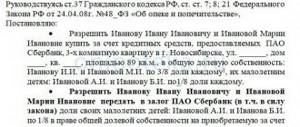Protection of the rights of minor children extends to all areas of life.
Children who have not reached the age of majority must have a home in which they can live permanently. According to the law, neither the parents nor the owners of the premises will be able to discharge the child anywhere. Based on this norm, many are afraid to register minors in their living space, believing that the very fact of registration gives them the right to property or part of it. To understand how true or false this statement is, you should study the current legislative acts in more detail.
Children's place of residence
All citizens under 18 years of age are considered children. Crossing this age limit symbolizes the transition to adulthood. The concept of adulthood is by no means just a term. The child, although he has extensive rights, cannot fully realize them on his own. This is due to limited legal capacity, which is caused by age. Partial independence in choosing actions occurs when children reach 14 years of age. At this age, citizens of the Russian Federation receive a passport, which gives them certain powers and removes some restrictions on their legal capacity.
Speaking about the place of residence of children, two stages should be distinguished:
- From birth until age 14.
- From 14 years to 18 years of age.
Residence issues are regulated differently in each case. To determine the place of residence in each period, it is necessary to refer to the norms of the Civil and Family Code.
Up to 14 years old
Children under 14 years of age are considered completely incompetent. In Article 21 of the Civil Code of the Russian Federation, the concept of legal capacity is deciphered as the ability of a person to independently make decisions, implement them and bear full responsibility for them. In accordance with this, the child cannot decide where to live; adults answer these questions for him. The fate of minors is held in their hands by parents, and in their absence, guardians or adoptive parents. They are the ones who choose the place of residence and register the child.
Article 20 of the Civil Code of the Russian Federation regulates that minor children under the age of 14 years can live, and accordingly be registered, only in the same place as their parents. If mom and dad live separately from each other, then the issue is resolved by agreement between adults or in court.
After 14 years
Upon reaching the age of 14, the child is issued a passport, in addition, partial legal capacity is established. It affects the ability to:
- Make decisions on transactions.
- Manage your income.
Please note that any action must be agreed with and approved by parents or guardians. In fact, a teenager can express his opinion and justify it, but he is still unable to take this or that action on his own.
It is from the age of 14 that a minor can be registered separately from his parents. He will not be able to check out of one place and register for another on his own, and the selection process itself remains up to the parents.
When submitting an application to the territorial center of the Ministry of Internal Affairs, a teenager must obtain the consent of both parents to perform the action.
Under guardianship
Guardians of minors are given a range of responsibilities in relation to children, but at the same time, parents, if they are alive, must also provide for their children financially. Registration of children under guardianship can be done in several ways:
- If a child has a legal right to the property of his parents, and he is registered there at his place of residence, then the guardians can register him with them temporarily or register him on a permanent basis. In both cases, the child’s rights to the apartment are preserved.
- If adults deprived of parental rights do not have property, the minor receives registration from the guardians, but property rights are regulated in a special way.
Guardians provide only temporary care for the child until he reaches adulthood. However, children raised in foster families, by law, must be registered at their location, which means they must have at least temporary registration at this address.
Legislation on the purchase and sale of apartments with minor residents
The Housing and Civil Codes provide for the development of measures to protect the housing and property interests of the child. To this end, there are a number of standards, including:
- Article 20 of the Civil Code of the Russian Federation - place of residence of the child;
- Articles 130, 131, 292 of the Civil Code of the Russian Federation - transfer of rights to real estate;
- Articles 26, 28, 37 of the Civil Code of the Russian Federation - the rights of a minor;
- Article 27 of the Civil Code of the Russian Federation - emancipation;
- Article 60 of the RF IC - property of a minor (ward);
- Article 70 of the Housing Code of the Russian Federation - registration of the child;
- Articles 19–20 of the Guardianship Law.
A significant role is played by the provisions of the Law of December 29, 2006 No. 256-FZ on the registration of an incompetent tenant in an apartment purchased with funds from the Maternity Capital certificate, which is provided for by the Government of the Russian Federation of December 4, 2009 No. 994.
Place of residence after parents' divorce
The ideal situation for both the state and people is considered to be conditions in which the family is complete, and the parents live together in marriage and raise their children. But unfortunately, unions break up extremely often, divorce statistics are alarming and continue to have a tendency to constantly increase indicators. When a family breaks up, all its members suffer to one degree or another, but this most acutely affects children, especially in cases where both parents conscientiously fulfilled their duties. The desire to raise minors continues to be expressed not only by mothers; today there are many examples when it is fathers who take custody and raise children. But each case is unique and requires an individual approach.
In case of divorce, the place of residence of children is determined based on the following indicators:
- The wishes of the parents and the presence of voluntary consent between them.
- Children's opinions are taken into account in any case, but are accepted as an official statement starting from the age of 10.
If the former spouses cannot resolve this issue on their own, they go to court. When making a decision, this authority is guided by the best conditions that one or another party can provide for their children.
The child is registered in the apartment but not the owner
The Centers for Disease Control and Prevention said there is no safe exposure level and is lowering its threshold for action to 5 micrograms per deciliter, half of what it was two decades earlier. Apartment residents are responsible for the maintenance and condition of the area immediately adjacent to their apartment. All entryways, balconies, patios, landings, hallways and landings must be cleared and left clean and tidy. Appliances, indoor furniture, food, cardboard boxes, carpet, mattresses, hazardous chemicals, trash, recyclables and tools should not be stored in these areas.
Do not remove this clip or use it as a hanger. It is your responsibility to read these materials and process them. An accumulation of paper on your door clamp may indicate an uninhabited apartment and may suggest theft. Check the door handle regularly for your safety.
Registration in a municipal apartment
You can register a child in a municipal apartment at any period of his life, provided there are existing official grounds.
The simplest option is the situation when one of the parents or both spouses live in such premises and are registered there. When children are born, their registration is carried out upon the application of any parent. In this case, there is no need to ask the consent of other registered residents or ask for permission to register from local authorities. If parents have received the right to live in municipal housing while already having children, then minors are registered there on the basis of mandatory residence with mom and dad.
It is possible to register a child in a municipal apartment separately from his parents. It occurs after the teenager turns 14 years old. But it should be borne in mind that he can become a tenant in municipal premises only if his other relatives are registered there, for example, a grandmother, or with the permission of the municipality.
Basic rights of the child
Having registration in a municipal apartment gives the child special privileges. In addition, he retains basic constitutional rights, such as:
- Providing food.
- Education.
- Health protection.
- Medical service.
- Recreation and entertainment.
- A full standard of living.
- Freedom of thought.
- Protecting your interests.
Among other things, children also have property rights. Article No. 69 of the Housing Code indicates that minors who live in premises under a social tenancy agreement have the same rights as adults and are the owners of this property. If parents voluntarily leave such an apartment with their children and register at a different address, then their rights will not be considered violated. But if other residents or the municipality itself want to terminate the rental agreement with minors, they will not be successful, because both the court and guardianship will, first of all, look after the interests of the children.
Step-by-step instructions: how to buy an apartment with a registered minor
If the children are not discharged from the apartment, the conditions and algorithm for the purchase and sale transaction change. New significant circumstances come into play that cannot be ignored.
What to do if there is a minor among the seller’s family members
You can identify the presence of a tenant under 18 years of age who is registered in the purchased living space as follows:
- from the seller's words:
- by checking the entry in the apartment register;
- having received an extract from the apartment register.
This document indicates the last name, first name, patronymic and date of birth of the registered persons. All that remains is to calculate how old the residents are now.
If a minor is registered in an apartment offered for sale or purchase, you need to ask the owner the following questions:
- Is it possible to discharge children to another living space before the transaction begins;
- if not, for what reason?
- whether the mother or father of the child has any residential property they own;
- if not, what kind of living space do the grandparents have;
- What guarantees can the seller give that the children will be discharged?
The algorithm for conducting the transaction and its feasibility depend on the answers received. If the owner cannot give intelligible answers, it is best to abandon the property before problems arise with the discharge of minor citizens.
I personally believe that if the child is not the owner, then it is best for him and his mother to leave the apartment that is offered for sale. This will save both parties from unnecessary paperwork and other suspicions and troubles. This will make it easier for all participants. There is another advantage of pre-registration - a larger number of potential buyers, since the presence of children can scare away a significant part of people who avoid risks.
Video: registration of a woman with a child
What documents must be presented by the seller
To conclude an agreement, the owner of the apartment submits a standard package of documentation, which includes:
- title document;
- title document;
- technical plan of the apartment;
- extract from the apartment register;
- permission from the guardianship and trusteeship authorities (when the minor is the owner);
- cadastral certificate confirming that there is no lien or seizure;
- if the seller is legally married in which the apartment was purchased, the spouse’s consent to the transaction;
- the same - if the spouses divorced less than 3 years ago, and there was no division of property;
- a court decision on the division of property in the event of a divorce between the seller and the spouse, if there was a division of property;
- if the seller inherited an apartment - renunciation of the right to the apartment from other co-heirs (according to their number);
- from co-owners of shared ownership - consent to the transaction with waiver of the pre-emptive right to purchase.
In the matter of permission from the guardianship authorities, a mistake often arises, which is made even by specialists endowed with legal powers. Sometimes they unlawfully demand permission when the child is only registered and does not own the living space. This is fundamentally incorrect: in Article 21 of Federal Law No. 48, such an indication is given only regarding minor owners on whose behalf the transaction takes place. Such rules do not apply to other incapacitated citizens.
Starting from 2021, in some cases a document subject to mandatory submission to the guardianship authorities is called a request from a notary. It seems that such a requirement is not entirely correct - the notary certifies the transaction after the guardianship authority issues permission and in the absence of such a purchase and sale will not take place. After reviewing the package of documents by the head of the municipal authority (in this case, the personal presence of both parents is required), permission is issued to dispose of the minor’s property... In practice, it is not always possible to fulfill such conditions. For example, sometimes the order indicates the need to simultaneously purchase another residential property, which means, in essence, the preliminary purchase of a new home before the sale of the existing one. For many families, this condition is impossible. If you believe that the conditions set in the permit are illegal, you can appeal it in court (as well as the refusal to issue a permit).
Marmalade
https://www.detkityumen.ru/forum/thread/686676/
How to draw up a purchase and sale agreement
The sale of an apartment is formalized by a civil contract. It is drawn up by the parties to the transaction. If a minor is not the owner of the object or its share, then information about him is not included in the subject of the agreement, as well as in other provisions.
The purchase and sale agreement is generally drawn up in a standard form
I strongly recommend introducing additional conditions for the discharge of the mother and child into the provisions of the policy, which will provide a significant guarantee to the buyer of real estate . To do this, you can formulate the following points:
- in the provision on the liability of the parties;
- in the provision on the reasons for termination of the contract.
In addition, it is permissible to establish penalties for violation of these conditions. When formulating these points, it is best to set deadlines for deregistration so that if they are violated, the new owner of the property can go to court. If such deadlines are not specified, the delay in the extract can be stated as a violation only one year after the document is drawn up. When concluding PrEP, you need to foresee all the risks and nuances that may be followed by the refusal of parents to sign out themselves and deregister their children.
The DCP is drawn up in triplicate. Then everything will depend on whether you need to contact a notary. If a minor is the owner, this is mandatory; if he is only registered, it is optional. An agreement without notarization is signed by the parties to the transaction, after which it is registered with Rosreestr.
The notary office is contacted at the location of the property with a full package of documents. The agreement is printed, but not signed. The signing procedure must take place in the presence of a notary. He will make sure that the document was signed by the proper persons who are parties to the contract or representatives acting in their interests. After this, he makes an identification note and puts his signature, which he seals.
If there is a minor among the owners of the apartment, the DCP is certified by a notary
Transaction registration procedure
After the agreement is signed, the transaction must be registered with Rosreestr - information about the transfer of ownership of the apartment must be entered into its information bank.
To carry out the procedure, the parties contact the multifunctional center (MFC) with a package of documentation, which includes:
- passports of the parties;
- title and title documents;
- PrEP in 3 copies;
- consent of the spouse (if housing is acquired jointly);
- permission from the guardianship and trusteeship authorities (if the minor is the owner);
- power of attorney, if the documents are submitted by an attorney.
The registrar accepts the package of documentation against signature. When the contract is certified by a notary, registration is free. If you sign the contract yourself, the fee is 2,000 rubles. The registration period depends on the conditions:
- 3 working days - if the parties to the transaction come together and submit a notarial agreement;
- 10 days - if they come together, but the contract was not certified by a notary;
- month - when the buyer and seller each submitted documents at their own time.
After registration, certified copies of contracts are issued for the buyer and seller - one for each. The buyer receives an extract from the Unified State Register of Real Estate (USRN), which confirms the transferred ownership of the property.
The right to privatize housing
A minor child registered in a municipal apartment has the right to take part in the privatization process open to this premises. The very fact of having a registration already puts the child on the list of privatizing persons. Although he will not lose this right after he reaches 18 years of age, the main condition is that he must be registered on the premises.
To carry out privatization, the consent of all residents is required; for minors, the agreement is signed by the parent. The child himself does not have any responsibilities for paperwork, but immediately after privatization he has his own share in the property. It can be disposed of after 18 years of age or earlier if permission is given by parents and guardianship authorities. A minor cannot be excluded from co-ownership; his rights are priority and equal in strength to adult residents of a municipal apartment.
What rights do the owner and the person registered in the apartment have?
2. The owner of residential premises has the right to provide possession and (or) use of residential premises belonging to him by right of ownership to a citizen on the basis of a lease agreement, an agreement for gratuitous use or on other legal grounds, as well as to a legal entity on the basis of a lease agreement or on other legal grounds taking into account the requirements established by civil legislation and this Code.
2. Family members of the owner of a residential premises have the right to use this residential premises on an equal basis with its owner, unless otherwise established by agreement between the owner and members of his family. Family members of the owner of a residential premises are obliged to use this residential premises for its intended purpose and ensure its safety.
Registration in a privatized apartment
Ownership of property and registration of residential premises are completely different concepts. One does not follow from the other as a mandatory measure. A citizen who has not reached the age of majority can be registered in a privatized apartment under two conditions:
- As a relative of the owner, for example, a son or daughter.
- As an outsider.
Regardless of the initial conditions, registration in a private living space does not entail the vesting of ownership rights.
When discussing the issue of registering minors in privatized property, we should not forget who exactly is the owner of the premises. According to the law of the Russian Federation, you can register in any living space, provided that the owner himself is not against such actions. A special feature of privatized apartments is the fact that there is no need to seek permission from other residents or local authorities. This applies not only to children, but also to adults. If the owner has decided to register parents with their offspring, then no one has the right to prevent him.
Child's rights to housing
A minor registered in a privatized apartment has the right to use the property on an equal basis with other family members. Otherwise, his privileges are determined by a combination of available factors:
- If a person who has not reached the age of majority is registered in the apartment of his parents, but does not have ownership rights, then he will be able to claim the property only after their death, as an heir.
- Registration in the apartment of an owner who is not the father or mother of the offspring; there can be no property claims on the part of the minor tenant.
The owner of the living space has the right to insist on the discharge of adults along with their children at any time, provided that he is not the parent of the latter. Former spouses after a divorce can initiate deregistration of the other half. In this case, the child is discharged only if the ex-wife or husband provides him with another place of residence.
Can he claim a share?
Despite the extensive protection of the rights of minors, legislative norms in property matters are still far from perfect. When dividing property between spouses, children are often not taken into account and shares are not allocated to them.
A child who has not reached the age of majority will be able to receive a legal share in the apartment only if:
- He participated in privatization.
- Provides inheritance rights after the death of one of the parents.
In other cases, it is quite difficult to obtain some part of housing while being of incapacitated age.
Features of the transaction if a minor is the owner of an apartment or share
If a minor is the owner of the home, the transaction procedure becomes more complicated and depends on his age. In any case, the transaction is subject to basic requirements:
- The responsible persons when concluding a transaction are the legal representatives. Authorized representatives can only be involved by proxy from legal representatives.
- The guardianship and trusteeship authorities must provide permission to sell, without which the transaction is considered illegal and is not subject to registration in Rosreestr (Articles 20, 21 of Federal Law No. 48 “On Guardianship and Trusteeship”).
- The DCP must be certified by a notary (Article 163 of the Civil Code of the Russian Federation).
When the owner has not yet received a civil passport and has not reached 14 years of age, legal representatives act in his interests. They independently or with the help of a realtor organize viewings of the property, submit advertisements to find buyers and set an acceptable price. The conclusion and registration of the contract is also carried out by them.
Provided that the young owner receives a civil passport - from 14 years of age until adulthood or emancipation - he can participate in the transaction himself . Then the procedure is carried out according to the following rules:
- The minor seller participates in the search for a buyer, showing the property and is fully informed by adults about the purposes of selling the home. If he does not want to sell his apartment or share, then forcing him to carry out the transaction is unacceptable.
- When drawing up a contract, the young owner is included in the contract as a party to it - he acts as the seller.
- The subject of the agreement includes information about the owner, and not about the legal representative who acts in his interests, and his passport details are indicated.
- The teenager independently signs the contract and other transaction documentation.
- The legal representative is present at the conclusion of the contract and next to the signature of the young owner puts his resume, which indicates the guarantee of the legal capacity of the minor’s signature.
- The same thing happens when transferring documentation for registering a transaction: next to the minor’s signature, a certification signature of an authorized adult is placed. It is entered with the wording: “I certify the signature of the Seller (full name).
The owner who has received a passport has the right to express his attitude towards the purchase and sale of an apartment, even if he is under 18 years of age
Approval of the transaction by the guardianship and trusteeship authorities is necessary to ensure that the interests of the child are respected. Legal representatives must justify to the guardianship that they are acting in accordance with the interests of the minor and are disposing of the property in the way that is best for the child - the owner of the apartment or share. Before concluding a transaction, they receive permission from the guardianship authorities to conduct it, and then report on the proceeds for the apartment. This situation is especially biased when a minor is under guardianship and the guardian is not the owner of the apartment (the housing belongs to the teenager).
Guardianship and trusteeship authorities pay special attention to the financial side of the issue. They do not cooperate with purchase and sale transactions when the market value of the property is higher than the amount received in the transaction.
However, according to some reviews, everything is not so simple, and sometimes guardianship does not give permission to sell the only home registered in the name of children if the parents do not have other residential property.
We sold and bought in the fall of 2021 with children's shares, allocated in proportion to the cost in the new apartment! And not just squares. If children own the only home, they will not be allowed to deposit money into the account. The only thing is, maybe if you move to another region. But even that is not a fact.
Domina
https://www.detkityumen.ru/forum/thread/686676/
In this case, the buyer should be careful, because the entire success of the transaction depends on the integrity of the child’s legal representative. And the slightest violation of the requirements of the guardianship authorities will jeopardize the sale of the apartment.








